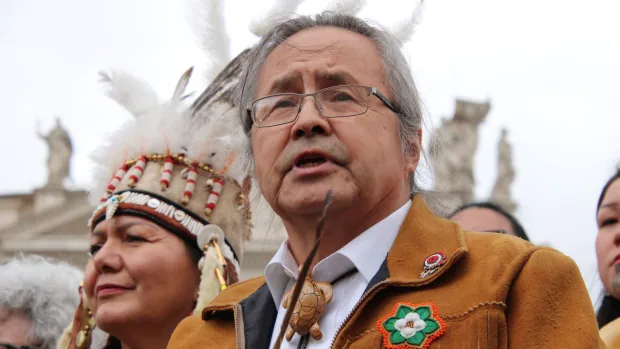Members of the Assembly of First Nations (AFN) urged Pope Francis on Thursday to revoke centuries-old papal decrees used to justify the seizure of Indigenous land in the Americas by colonial powers.
Two papal bulls issued in 1455 and 1493 gave the church’s blessing to explorers’ claims to Africa and the Americas.
The Doctrine of Discovery is based largely on those papal bulls, issued by Pope Nicholas V and Pope Alexander VI.
“If you look at our history … what happened since they landed on our shores, then basically it’s genocide,” said Gerald Antoine, Dene national chief-elect and AFN regional chief of the Northwest Territories.
“We need to right the wrong.”

The AFN delegation — the last Indigenous group from Canada to meet privately with the Pope this week before a final public audience on Friday — is calling on the Vatican to scrap the doctrine.
The move would fulfil the Roman Catholic Church’s role in the Truth and Reconciliation Commission’s call to action 49, which urges all religious and faith groups to repudiate concepts used to justify European sovereignty over Indigenous lands and people.
Legal expert blames doctrine for reconciliation’s failure
The Doctrine of Discovery declared lands held by Indigenous Peoples to be terra nullius — Latin for “nobody’s land.”
Kaluhyanu;wes Michelle Schenandoah, a member of the Oneida Nation, said the basis for the doctrine was the belief that non-Christian Indigenous Peoples were without souls.
“Because we didn’t have souls, that gave the right for these explorers to do whatever they wanted with Indigenous Peoples — murder, rape, enslave,” she said.
Schenandoah said the doctrine has shaped the mentality and behaviour of Western culture for centuries.
She also said there’s a direct connection between the doctrine and the disappearances and deaths of Indigenous women in Canada.
In many pre-contact Indigenous nations, she said, women had the final say on how the land was used — making them obstacles to European exploration and settlement.
“When you look at how these countries have treated Indigenous women, we are on the bottom rung,” Schenandoah said. “Because the doctrine has placed us in this place of being invisible and dispensable, therefore the countries treat us this way.
“What gives any human or nation the right to claim dominion over any other human or nation anywhere in this world?”
The doctrine worked its way into law and influenced Canada’s Indian Act, land claims and the residential school system.
Bruce McIvor, partner at First Peoples Law in Vancouver, said the Pope could change things in Canada by renouncing the doctrine.
“It would create impetus in Canada for the courts and governments to get serious about addressing this fundamental lie that’s at the foundation of non-Indigenous claims to Indigenous lands in Canada,” he said.
Pope called upon to ‘take the first step’
McIvor said the federal government could also pass a law revoking the doctrine.
“If the Pope took the first step, that would create impetus for the federal government to do the same thing,” he said.

McIvor said he believes the lingering influence of the doctrine is the reason reconciliation continues to fail in Canada.
“When we hear the word reconciliation, what most Canadians don’t realize is that is invoking the Doctrine of Discovery,” McIvor said.
“Because when the courts and … government say reconciliation, they mean reconciling with this fundamental lie that colonizers can just show up and claim Indigenous lands.”
















%20(2)%20(1).jpg)


Discussion about this post